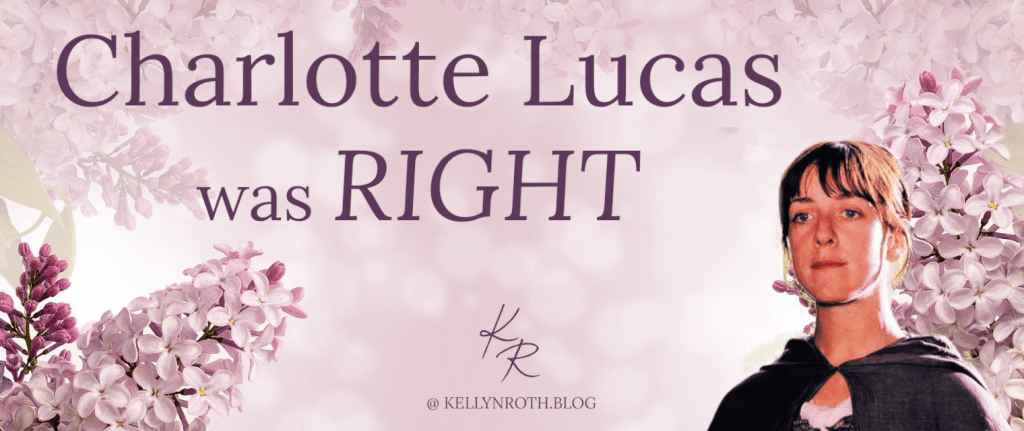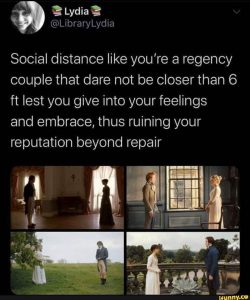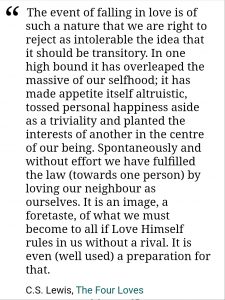
“Happiness in marriage is entirely a matter of chance.”
Charlotte Lucas makes this dour prediction to Elizabeth Bennet, the heroine of Pride & Prejudice.
We laugh. It’s not true, after all. We all know that there are many, many things that you can do to guarantee happiness in a marriage. Like talking over all the things that you believe in. Or hanging out with them a lot to make sure you don’t hate the way he picks his nose (and eats it).

Some of the more mature among us may add that happiness in a marriage is not that important—faithfulness, something within our control, is.
But even those mature ones, who know that happiness is not the primary consideration, think that Charlotte Lucas is saying something that is either dated or downright untrue.
Now, I could just nod along and let this slide. I mean, it’s one line in a classic novel that isn’t even my favorite of Austen’s. However, my obsession with Keira Knightley and my never-ending desire to say things that will annoy people won’t allow me to do that.

I have to break it apart, y’all. I have to.
So let’s get into it.
First, yeah, it is a bit dated to say that.
Now, I’m going to go ahead and say what we’re all thinking: CHARLOTTE, NO ONE COULD BE HAPPY WITH COLLINS SO CHANCE SCHMANCE!
But otherwise? With a man a bit less on-the-nose and satirized than Collins? The way people became engaged and married back in the day meant that Charlotte was correct.
A lot of the time, couples never had a moment alone until they were married. (Can you imagine your honeymoon being the first time you were alone with your husband? Ew.)

Furthermore, because of propriety and Regency-era social distancing (by the way, that ^^ is the only acceptable 2020 meme), there was next to no chance that couples of this era would have seen the real “behind the mask” (if you’ll pardon the joke) man or woman until after they were married. If the mask ever dropped.
So I think it’s safe to safe that Charlotte Lucas was 100% correct in her era, excepting perhaps in the situations laid out in Jane Austen’s novel. (I mean, once a guy saves your sister from ruin and has a real big estate, you pretty much know what he’s like.)

But now we don’t “social distance.” (*chokes at my own joke*) Now we go on dates and get to know each other before we commit to a relationship, which means there’s no such thing as getting engaged to someone you barely know or …
Is there?
Everyone is giving me a weird look, but here’s the thing.
In Christian culture, we’ve got a problem. We’ve created a culture where, nine times out of ten, Charlotte Lucas is right.

(#mood)
We’ve made Charlotte Lucas right because we’ve created a purity culture that makes sex the one and only benefit of marriage and encourages couples to commit to deeper level of commitment before they’ve had any time alone.
So I’m going to tackle those thoughts one at a time.
First:
Sex is not the only benefit of marriage!
I’ve seen, of late, this attitude amongst single people — and with the big push for purity in the Christian culture in general — that being married is basically “friends with benefits.”
When you’re married, you get to have sex. So basically, you find someone of the opposite sex who is your best friend, and marry them, and that’s it. It’s a friendship relationship with sex getting added in.
The reason Christians believe this is because secular culture is starting to, too. *gasp* Gone is that secret mystic spark (which I also don’t really care for, but at least it was a bit special). Now the difference between a friendship and a romantic relationship is physical attraction.
But here’s the thing. We find lots of people physically attractive. I mean, I’m attracted to Chris Evans, but I wouldn’t marry him. (He is at least twice my age. At least.) (And also unattainable.)
And we need strong relationships other than romantic ones (which is significantly rarer by design than a friendship). I love this push in today’s culture, specifically among my generation, for friendships and sibling and parent relationships to be deeper, better written, more discussed.
But we can’t lower down the marital relationship to just “friends with benefits” because we want to spend more time focusing on other relationships. That cheapens marriage. (You should never make one thing less to make another more if both are equally worthy. I’m looking at you, Feminist Movement.)
Marriage is not the only relationship God compares to His relationship with Christians (He’s also our father, remember? And we are called to give up our lives for our friends as well as our spouses), but … it is the only relationship God refers to as “becoming one.”
There’s more to marriage than just “yay now we can finally have sex.”
Okay, fine. But how do these tie into Charlotte Lucas?
Because when we say that the only difference between friendship and romance is sexual attraction, we say, “You just have to be good friends and then be sexually attracted to each other to have a happy marriage.”
However, you can be friends with someone for years, and until that relationship crosses into romantic, you’re not going to know how they act as a husband or wife.
This means, for those that dive into marriage without a period of romantic adjustment (e.g. dating or whatever you want to call it – it’s all dating), happiness in marriage is a matter of chance. It might work out. Or it might not. (This depends on a point I’ll discuss below, and not on your compatibility, but still. Chance.)
I personally believe, based on my observations and personal experience, it’s not gonna take more than a couple months to know if the relationship side is going to work, but still, no hopping right in!
Any (non-abusive) marriage can work — because God wouldn’t have asked us to stay, to try, if this weren’t true — but it is possible to start out with a firmer foundation from a worldly perspective as well as a spiritual perspective.
Some people just aren’t naturally compatible, and it’s true, and there’s nothing wrong with you if you aren’t madly in love with a Christian man or woman who “seems perfect.” It may be a sign that, though you could technically “make it work,” you might want to find someone with whom there’s actually a honeymoon stage.
Both men and women behave differently with someone they’re considering marrying than someone they just see as a friend. We can’t help it — it’s just the way we are. We make different claims on them, prioritize them in a different way, and so on. When that difference doesn’t show up, well, there’s a problem.
There should be something special there; something that would cause you to go, “Yeah, I’d be fine if we ceased to function independently of each other.”
I suppose what I’m saying is …
Despite being the utter unromantic I am (and I AM an unromantic – I always will believe love is not the end-all), well, I believe falling in love is a thing we can’t entirely rule out. No reason to base your life around it – but, if there’s no reason for you to not be in love with someone (e.g. they’re a single Christian who you are dedicated to starting a godly relationship with), why not?
To clarify, I’m not saying being in love is the end-all. If I ever say that, or say it’s a higher form of love, or say literally anything like that, shoot me. Repeatedly. Until I am dead. I have lost my Kellness, and I might as well die anyways.
But to quote C.S. Lewis:
“Being in love is a good thing, but it is not the best thing. There are many things below it, but there are also things above it. You cannot make it the basis of a whole life. It is a noble feeling, but it is still a feeling.
Now no feeling can be relied on to last in its full intensity, or even to last at all. Knowledge can last, principles can last, habits can last but feelings come and go. And in fact, whatever people say, the state called ‘being in love’ usually does not last. If the old fairy-tale ending ‘They lived happily ever after’ is taken to mean ‘They felt for the next fifty years exactly as they felt the day before they were married,’ then it says what probably never was nor ever would be true, and would be highly undesirable if it were.
Who could bear to live in that excitement for even five years? What would become of your work, your appetite, your sleep, your friendships? But, of course, ceasing to be ‘in love’ need not mean ceasing to love. Love in this second sense — love as distinct from ‘being in love’ — is not merely a feeling. It is a deep unity, maintained by the will and deliberately strengthened by habit; reinforced by (in Christian marriages) the grace which both partners ask, and receive, from God.
They can have this love for each other even at those moments when they do not like each other; as you love yourself even when you do not like yourself. They can retain this love even when each would easily, if they allowed themselves, be ‘in love’ with someone else. ‘Being in love’ first moved them to promise fidelity: this quieter love enables them to keep the promise. it is on this love that the engine of marriage is run: being in love was the explosion that started it.”
But C.S. Lewis also remarks:

Basically, despite my natural dislike of the nonsense that is emotion … I do approve of falling in love, in a way. If it’s that (^^) kind, I absolutely approve.
But back on track:
Personal perspective on the whole Charlotte Lucas issue?
I was in an on-paper perfect relationship, and it didn’t work for me. But there was no way I could’ve known until we dated.
In fact, I didn’t even know from talking to him about marriage and the future and all that — we believed the same, verbally, on every front. It took legitimate one-on-one time with him to realize it wouldn’t work.
I would’ve betted anything that it’d work out between us, and in hindsight … I think I would still make that bet. I needed to be his girlfriend before I would’ve decided not to be with him.
If I hadn’t dated him, and we’d been able to move forward a little quicker (thank goodness for college), happiness in my marriage might’ve been a matter of chance. Because I thought I could make it work … because he was a good friend.
Honestly, though, before you go thinking I believe in some magical Disney spark (*coughs* I still don’t):
Just about the only way we can assure we’ll be happy is:
To find someone who’s willing to fight for their marriage by including God in every facet.
Because, if you pay attention and actually develop a relationship with God, you’ll find that He is totally on the side of married couples, and He wants to help them.
But this isn’t about happiness of the same sort Charlotte Lucas was referring to, exactly. This is the only kind of happiness that is real — it’s actually not happiness so much as contentedness or joy — but it’s not what Charlotte meant, now, is it? Because we can and should control this kind of happiness. We can choose it; therefore, it cannot be a matter of chance.
When it comes to the “making at least the beginning of the marriage easier” happiness? Well, that can be a matter of chance — if you are a Regency woman.
Or if, like me, you try to act like one.
So was Charlotte right?
Yes, she was. And no, she wasn’t. It all depends on your definitions — and how you chose your husband or wife.
I don’t know that I have a takeaway for y’all this time. I just wanted you to be thinking because … I honestly do believe I, as a fairly modern Christian in terms of dating (e.g. I don’t believe in courtship) almost fell into this trap (or I would have if I could have, rather).
And I think, no matter what our conclusions are, we should make sure we’re not hopping into relationships, that we’re taking life seriously … but that we’re acknowledging that not everything is doom, gloom, and potential sin.
Therefore, I shall decline to give you a solid conclusion but I will ask … what are your thoughts? Is happiness in a marriage a matter of chance – and does that therefore give us a better opening to exercise God’s grace?
TTFN!
~Kell~


12 Responses
Great thoughts, Kell. Thanks for sharing them.
Absolutely! Hopefully it wasn’t too … *squints* Honestly, I’m not even sure what it was. A burst of random silliness. 😛
I loved reading this! I just love your rants and rambles, but I think this validated some things that I’ve been thinking, but haven’t been able to state as well as you did. 😀 And the whole pulling P&P into it really got my attention. XD
Thank you! I’m so glad you enjoyed it. I certainly worked hard to make it work! 😀 Even though it was a bit silly, I admit. 😉
I enjoyed reading this, Kell! Sillyness aside, you made good points. 🙂
Well, thank you! 😀
I dated a guy with “no red flags” where if we had gone ahead and gotten married it would have “worked” because I was willing to make it work. But I was the only one putting in any effort to the relationship.
I think that’s a common issue – and something I can totally relate to!
This was very good! Regarding your opinion that after a couple months you can know if someone is a good marriage candidate, I think it varies from person to person, but it was true for me. After knowing my now-wife as an acquaintance for about 3 months, and then dating her for 6 months, I knew she was the one I’d marry.
I’m sure it can vary – it just has always proven true for me that the decision came fairly early on.
I love this post, as I knew I would. 😛 And those C.S. Lewis quotes are so good!
I know! He always has some of my favorite quotes.